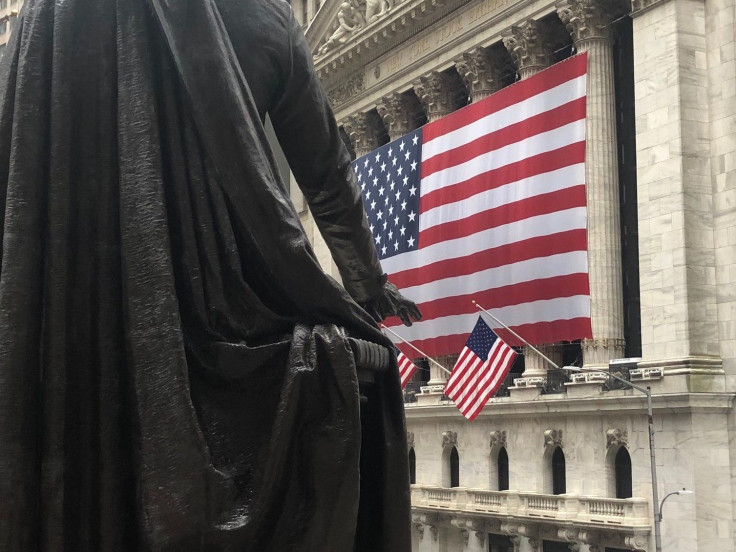Monday’s Stock Market Close: US Equities Reverse Course, Gain On Fed Plan To Buy Corporate Bonds

KEY POINTS
- The Fed said it will buy individual bonds with remaining maturities of five years or less
- The Empire State Manufacturing business conditions index climbed by 48 points to minus-0.2 in June
- Chinese industrial production jumped by 4.4% in May
U.S. stocks gained on Monday after the Federal Reserve said it will start to purchase individual corporate bonds, in addition to the corporate-bond exchange-traded funds it has already been buying.
The Fed’s announcement Monday reversed earlier stock market losses triggered by worries of a second wave of coronavirus cases across the U.S.
The Dow Jones Industrial Average gained 157.62 points to 25,763.16, while the S&P 500 rose 25.28 points to 3,066.59 and the Nasdaq Composite Index jumped 137.21 points to 9,726.10.
Monday’s volume on the New York Stock Exchange totaled 4.93 billion shares with 1,859 issues advancing, 26 setting new highs, and 1,095 declining, with six stocks setting new lows .
Active movers were led by Hertz Global Holdings Inc. (HTZ), American Airlines Group Inc. (AAL) and Genius Brands International Inc. (GNUS).
The Fed said it will buy individual bonds with remaining maturities of five years or less on the secondary market
The purchases will be designed “to create a corporate bond portfolio that is based on a broad, diversified market index of U.S. corporate bonds,” the Fed stated. “This index is made up of all the bonds in the secondary market that have been issued by U.S. companies that satisfy the facility’s minimum rating, maximum maturity, and other criteria.
“The Fed is always going to try and show who’s boss,” said Ilya Feygin, senior strategist at WallachBeth Capital. “It’s continuously proving it can do more and it’s effective. That’s been the primary driver of this market.”
But fears of the covid-19 pandemic persist.
Some states – including Alabama, California, Florida and North Carolina – have reported a jump in new daily coronavirus cases, as they prepare to reopen nonessential businesses.
“The coronavirus is spiking up again and that’s a problem,” said Peter Cardillo, chief market economist at Spartan Capital Securities. “There was also over-exuberance in the market. The market was discounting a quicker economic rebound.”
New York Governor Andrew Cuomo warned he may revoke liquor licenses from bars and restaurants over complaints that these businesses have violated social distancing rules.
“The Covid deterioration in certain states will stay an overhang for the market, although it would take a sustained increase in U.S. numbers overall to spark a dramatic shift in the narrative,” said Adam Crisafulli, founder of Vital Knowledge.
William Schaffner, a professor at the Vanderbilt University School of Medicine, warned: “The second wave has begun. We’re opening up across the country, but many, many people are not social distancing, many are not wearing their masks.”
The New York Fed’s Empire State Manufacturing business conditions index climbed by 48 points to minus-0.2 in June, much better than expected.
Chinese industrial production jumped by 4.4% in May, up from a 3.9% increase in April.
Overnight in Asia, markets finished lower. The Shanghai Composite dropped 1.02%; Hong Kong’s Hang Seng retreated 2.16%; while Japan’s Nikkei-225 fell 3.47%.
In Europe markets finished lower, as Britain’s FTSE-100 dropped 0.66%, while France’s CAC-40 fell 0.49% and Germany’s DAX tumbled 0.32%.
Crude oil futures jumped 2.18% at $37.05 per barrel, Brent crude edged up 0.05% at $39.74. Gold futures slipped 0.32%.
The euro rose 0.52% at $1.1316 while the pound sterling gained 0.38% at $1.2587.
The yield on the 10-year Treasury edged up 0.43% to 0.702% while yield on the 30-year Treasury slipped 0.14% to 1.448%.
© Copyright IBTimes 2025. All rights reserved.




















